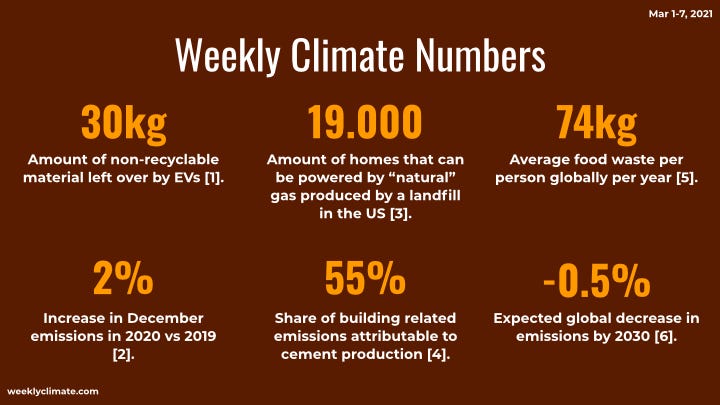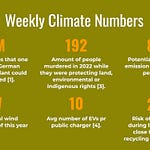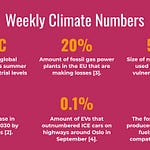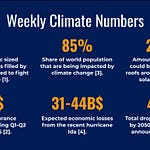Welcome to this weeks edition of The Weekly Climate 🎉
References: [1], [2], [3], [4], [5] and [6].
This friday my co-founder Martin Ferro-Thomsen and I (and a whole host of lovely advisors and partners) launched our new project Massive.earth. If you already read our launch blogpost you can just skip forward to the newsletter part. I wanted to feature it here since this initiative is very likely interesting for a whole lot you, my dear readers. For those of you who have been subscribing for a long time you will probably also see a resemblance in the way we structure our work at Massive.earth and the way this newsletter is designed 🤓.
Here is our launch blogpost, which first appeared on LinkedIn.
Massive.earth is live
Together with Martin Ferro-Thomsen I’m launching Massive.earth today. With this platform we hope to begin a mass mobilisation of talent to solve the climate crisis. We’re fortunate to get help from advisors Kristian Jensen, Connie Hedegaard, Katherine Richardson, Saul Griffith, Lubomila Jordanova and many others.
Why are we doing this? Despite all of mankind’s efforts the climate crisis is still escalating. We’re now headed towards 3 degrees in global temperature increase. The 1.5 degrees we were hoping for were bad enough. Double that and you have an effective recipe for human misery. It’s happening, it’s real.
The climate crisis is a crisis of execution. We’re not shifting fast enough to a sustainable way of life. Why is that? We believe the core reason is that most of us are still living and working in an old world economy. The way we consume and earn a living are tied to business models, which continue to destroy our natural habitat, either directly or indirectly. Follow the money and you’ll find it’s usually true.
This is our systemic and socioeconomic reality, not any individual’s fault. But until the majority of us transition into a new and sustainable economy, nothing major will change. Massive.earth is founded to accelerate this transition.
Here’s what we’ve got so far:
Massive.challenge. A three month program for anyone to start climate action startups and projects. It offers education, support and acceleration. It’s day-job friendly, free and online to mobilise as much talent as possible. We hope to invest directly into fundable startups and support everyone else through partnerships.
Market AND society: The Massive.challenge will help classic market-driven startup or technology projects get off the ground. But we realize we need systemic change as well. And that will come from society-oriented projects like campaigns, policy proposals, new NGOs and movements. We help realize these projects as well.
Massive.roadmap. A ~100 page White Paper that deep dives into the complex science of climate change. There’s a summary with 7 actionable missions and a Catalog of doable solutions that the world needs to develop, implement and scale to help avoid the crisis.
How to be involved
Join our kickoff 22 March. It’ll feature keynote speakers such as Mark Lynas, C40, Dradown Europe, Forests of the World, Changing Streams and Carbon Removal Centre and more and present our Roadmap. It’s free and online.
Enroll in our Challenge as an individual, team or idea.
Become a mentor to help others succeed.
Spread the word if you like it, or share ideas, feedback etc. right here.
A huge thank you to everyone who’ve helped us get this far, we’ve tagged some of you below. Also thank you to our allies, Greentech Alliance, Project Drawdown Europe and Carbon Removal Centre.
For you my dear readers, I also want to offer you a special treat, which is the special inside story of how I got to Massive.earth. I have not shared this story anywhere public yet so you’re the first to read it. You can read it here.
Ok thank you for your patience, now on to the newsletter!
‼️News you can’t miss
Here’s one important scary/bad (🙀), good (😻), interesting (😼) and fossil (💩) news item.
🙀 The world pledges emissions cuts, then how come we do not expect to lower emissions by more than 0.5% by 2030?! We should be at 50% there.
😻 Marine sites all across the world lock away a total of 5Gt of CO2
😼 A new study has calculated the difference in life-cycle material use between an EV and an ICE car.
💩 Japan, US and Germany was singled out by Antonio Guterres in a speech recently, because these countries have no plans to phase out coal by 2030.
👩⚕️ Status: Climate & Science
Let’s look at how we’re doing this week!
[#iceberg] — A huge iceberg with a total area of 1270 km2 has broken off in the Antarctic. That’s 10 times the area of Copenhagen, about twice the size of New York City, but still 4 times smaller than the worlds largest iceberg A68a. It’s been almost a decade since the British Antarctic Survey detected the first cracks in the ice that ultimately has lead to this gigantic iceberg. Here’s a stunning video of that huge iceberg. It’s huuuugge.
[#sealevel] — Most climate models predict 60cm of sea level rise by 2060 in Miami, which will prove a big problem for most buildings in Miami. The city just released a plan for how to adapt to that, which is essentially focussed on raising homes and roads. This “🎧 How to save a planet” episode from November 2020 also looked at Miami’s real estate market, which appear to wear blinders to this problem.
📰 The 7 Grand Challenges
⚡️Decarbonize Electricity
Clean electricity is the one do-or-die challenge we must solve.
[#nuclear] — On the 10 year anniversary of the Fukushima accident, a new report by OECD Nuclear Energy Agency recaps the accident, the status of the site and the lessons learned.
[#energystorage] — One piece of good news from 2020 — a huge surge in battery storage in the US. Especially front-of-meter (ie. utility scale) installations have surged a lot. 2.1GWh of capacity was installed in Q4 2020 in the US. US also beat their own record for wind deployed in 2020.
[#landfill] — A detailed look at how landfills actually produce “natural” gas to power homes. The problem though is that burning this gas still emits CO2 so in a carbon-free world how will industries like this one work?
[#emissions] — Bloomberg has released the 2021 version of its Executive Factbook which summarizes the current status of decarbonization and the energy transition. It’s main headline conclusion: More than 50% of global emissions are now covered by a net-zero target. A good start. But it’s then worrysome that we can only expect to see 0.5% drop in emissions by 2030. (see the scary one earlier)
🏘 Reduce impact of urban and rural areas
Lowering the impact of urban and rural areas.
[#shopping] — A new organisation has started certifying products for being climate neutral. Grist looks into what this new label is and how it works.
[#ev] — A new startup, Ample, has launched a new EV battery swap station, that is said to avoid the failures of previous attempts at doing this. The main way this is done is by targeting commercial fleets and not ordinary drivers.
[#ev] — And more EV news: Volvo also joins the bandwagon of going full EV by 2030.
[#electricmotor] — A startup backed by Bill Gates, Robert Downey Jr. and iPod inventor Tony Fadell, has invented an electric motor that has a much lower energy consumption. This is not only interesting for EVs, but certainly also for the millions of electric motors that are present in anything from automatic doors to air conditioning.
🛁 Clean non-electrifiable activities
Some activities we do today can’t be electrified, these must be cleaned some other way.
[#cement] — 11% of total global emissions comes from cement production. Here’s a great overview of cement production, what the problem is and projects that are working on making it clean!
[#shipping] — Fraunhofer has announced that they have invented the first high temperature ammonia powered fuel cell for shipping. Shipping is one of the harder industries to decarbonize because of the high energy density requirements. Ammonia has been on the radar for a long time, but apparently Fraunhofer is the first to make an ammonia fuel cell to be used in shipping. And related to Fraunhofers news. This article goes into new ship designs that will also offer low carbon shipping alternatives.
🌳 Protect and grow nature
Nature is our ally, we must protect it and help it help us.
[#ocean] — The UN has mapped all 50 oceanic UN World Heritage Sites and how much carbon these sites have stored. All 50 store around 5Gt of CO2, but three in Australia store the vast amount — a total of 2Gt of CO2 is locked away in these. We’re talking about the Great Barrier Reef, Shark Bay and Ningaloo coast.
🍽 Optimize food
Without the lower impact of food or drink the hero doesn’t work (modified old danish proverb).
[#foodwaste] — A new UN report reveals that people worldwide wastes 1Gt of food every year. Food discarded in homes alone is on average 74 kg per person every year (which probably varies a lot country by country). In short, if food waste were a country it would be the third biggest emitter.
⚖️ Climate Justice
Without justice there’s no future.
[#uganda] — Here’s a story about how the Ugandan city of Okere Mom-Kok was transformed from ruins to a fledgling town with a school, a health clinic, village bank and a community hall which serves as a cinema, church and nightclub. The cost: 39.000 GBP. The project was lead by Ojok Okello, a former NGO worker who got disillusioned about seeing NGO projects fail because citizens of the cities were ultimately let out of decisions about their societies (according to Ojok).
[#environmentalrascism] — In a move that is being called environmentally racist, the big petrochemical plant company Formosa wants to expand its production facilities in Louisiana’s “Cancer Alley” black-neighborhood with a gigantic plant producing petrochemical plastic and a material used in anti-freeze. The name of the plant: “The Sunshine Project”. I mean come on...
[#lawsuit] — A new climate lawsuit launches in Australia in which a youth group sues the Australian government for lack of climate action. The hope is that if they win, this will stop the Australian government in approving new fossil fuel projects.
⬇️ Engineered drawdown and geoengineering
Protecting our planet and species one way or another
[#book] — A review of Elizabeth Kolbert’s new book, “Under a white sky”, which details mankinds attempts at controlling nature. Right from fighting invasive species in ecosystems to geoengineering. It sounds very interesting and is for sure on my reading list.
📦 Other / catch-all
All the other stuff that I couldn’t fit into any of the other categories, than the other category.
[#activistinvesting] — This is awesome and not just because of the inspiring story from this guy Casey Harell. Activist investing is a technique in which big shareholders can force company boards to take action on various things. Recently this has been used by big fund manager Chris Hohn to force climate action, but Casey is using the same technique to gather 1000s of small investors to do the same. Love this. Read about him and the initiative here.
[#meta] — This article is arguably a bit meta. But I think it’s really important. When I decided to start this newsletter I did it as some of you know, to scratch my own itch. But with a growing reader count I soon realized that “holy shit” I have a responsibility now. I’m no longer just scratching my own itch I’m scratching other’s too (eh sounds weird, but I’m sure you get it). I’m by no means a journalist even close in quality to Emily Atkin from Heated (this link) and Emily Holden (who she interviews) but because I have an audience with this newsletter in a field where disinformation is rampant I have a responsibility to not just share everything I read but actually “be a journalist” even though I’m by no means one. So I’m trying my best and think it’s been going quite well so far. But in this piece the 2x Emily argues that climate journalism needs to be hard-hitting and in order to get people to act. It doesn’t need to be doomist, but just state the facts clear as they are. That is also what I’m trying to do here. Read their interesting discussion here.
[#carbonaccounting] — “We’re going netzero by 2050”. That sentence has been said by many nations leaders these past 6 months. The problem though is that a new report has shown that countries actual real life emissions will only drop by 0.5% by 2030 and not the 50% we need. How can countries then say they’re going net-zero by 2050. Because of clever carbon accounting tricks...
⭐️Special Topics
🎩 Global and local policy
We have a special interest in covering the major global and local policies regarding climate, whether good or bad.
[#coal] — Antonio Guterres singled out Japan, US and Germany to commit to phase out coal by 2030 at a speech at an initiative called “Powering Past Coal Alliance”. Neither Japan, nor US has any concrete plans to phase-out coal and Germany has declared that it will continue to burn coal until 2038.
[#peace] — Most countries in the UN Security council agrees that climate change represents a security threat. But Russia vetoed the decision to officially recognize climate change as a security threat citing that climate change is being dealt with by other UN offices. India joins Russia in the critique.
⛽️Major Carbon Emitters
We have a special interest in covering the moving of the major carbon emitters as these are the key roadblock to climate action.
[#bankruptcy] — Although great for the climate, the recent increase in coal mining companies going bankrupt is both taking it’s toll on the many workers who are being abandoned (with paychecks bouncing), but also the mining sites which are just being left alone are a potential environmental hazard. Something need to be done.
[#emissions] — A new IEA report says that we’re back to business-as-usual. Although emissions in 2020 overall fell, in December 2020 we emitted 2% more CO2 than we did in December 2019. So don’t think for a second that COVID made any difference on emissions at all. We’re already emitting emitting than in 2019.
[#fossilgas] — Here’s another fresh example of the fossil fuel industries attempt at stopping climate action. Austin, Texas, had a plan to decarbonize their buildings by 2035 and 2040, which of course meant electrifying buildings and removing old fossil fuel equipment such as gas burners and stoves. That was until the local gas company got involved.
That’s it for this week folks! Remember if you’re feeling down, angry or sad from some of the news in this newsletter one cure is to act. And one way you can always act that also happens to be one of the most powerful things you can do is to talk about it. That also works if what you just read made you hopeful or happy btw.
If you enjoyed this newsletter don’t forget to share it with your friends, coworkers or other people you think could benefit from getting it. If you got directed here by a friend or another link on the Internet don’t forget to subscribe!
See you all next week 👋












